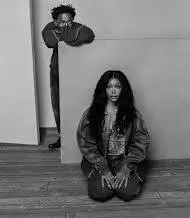by Anton Dedvukaj
Hello everyone, and welcome back to Mic Drop. Today, we’re here to talk about a growing trend in the music industry: namely, the rise in popularity of older songs and albums as opposed to new releases.
This has come to my attention following the recent news that Billboard reported on Monday. On the Hot 100 charts, Glass Animals scored their first No. 1 single with “Heat Waves”. At first glance, you may think that this is no big deal. An indie alternative band scoring a surprise crossover smash hit? This was a thing that has happened several times over the past ten to fifteen years. So, what makes this particular No. 1 hit so noteworthy?
Well, this song actually shattered the record for the longest climb to No. 1 in the Hot 100’s history, as it is currently on its 59th week of charting. It demolished the previous record, Mariah Carey’s “All I Want For Christmas Is You” and its 35-week-long climb, to take the record.
For reference, the song debuted at No. 100 back in January 2021. Back then, Olivia Rodrigo was simply known as a Disney Channel star, Lil Nas X was still the “Old Town Road” guy, Taylor Swift hadn’t yet begun re-releasing her albums, and Silk Sonic did not exist yet.
Okay, big whoop, you may think. One song just decided to take the scenic route to the top. What significance might that have? Well, it highlights a bit of a trend I’ve noticed: people seem to really love streaming older music now.
This can be taken in one of two ways. On one hand, you have songs that are having much longer shelf lives. For example, “Levitating” and “Save Your Tears”, the two biggest hits of 2021, are still in the top 20 and have both charted for over 60 weeks. Or, you can look at it from the perspective of all of the older songs now getting bursts in popularity. Taylor Swift’s 2010 album track “Enchanted” briefly hit the top 10 on US Spotify a few months back, and Frank Ocean’s 2012 single “Lost” did the same earlier this winter.
Then, of course, there are songs that are already proven hits from years past that refuse to go away. J. Cole’s 2015 hit “No Role Modelz” and The Neighbourhood’s 2012 track “Sweater Weather”, both of which were fairly big hits when they were new, are in the top 30 on US Spotify. From there, songs like Tyler, The Creator’s “See You Again”, Lil Uzi Vert’s “20 Min”, Kanye West’s “Heartless” and “Bound 2”, Kid Cudi’s “Pursuit of Happiness” and “Mr. Rager”, Kendrick Lamar’s “Money Trees”, and many more are in the top 100. All of the above songs have release dates ranging from as recently as 2017 to as far back as 2008.
And on top of that, newer songs that score big debuts aren’t as easily able to last on the charts. For reference, “We Don’t Talk About Bruno” is the only song in this week’s top ten that debuted on the charts in 2022. Meanwhile, its parent album, the Encanto soundtrack, has been able to dominate the Billboard 200 albums chart all year – save for the week that Gunna and The Weeknd each released albums – not because it’s selling insane amounts of units, but because nothing else is challenging it.
So, why is this happening? Why is nobody streaming newer music and just sticking to older music that they’ve heard countless times before?
Well, on one hand, it is a matter of perspective. None of the songs I mentioned above as songs from years ago gaining traction again were number one hits. Save for “Heartless”, none of them broke the top ten, and several didn’t chart at all. So, maybe these songs are new to a younger crowd of people who didn’t hear them when they were new, or these songs slipped many people’s radars because they weren’t big enough to get noticed the first time.
I also asked a couple of Irvington students to give their opinions on why they thought this was the case. In truth, I think that both of these could also be contributing factors.
“Times are hard now, and nostalgia helps people,” junior Jordyn Eckers told The Paw Print. “So, if you’re listening to a song that once made you feel good, you might want to listen to it again.”
Fellow junior Theo Levin offered a slightly different perspective. “New albums take a while to create, and because of the pandemic, a lot of artists needed to pause producing music,” he said. “So with less new music being released, people turn to the older stuff.”
While I definitely do understand these perspectives and agree that they are contributors, I also really hope that the music scene begins to become more interesting as COVID-19 restrictions get lifted and we begin to return to a sense of normalcy. Here’s to hoping that the music scene of 2022 is able to develop further, even as it brings a few older hits along the way.






Be First to Comment